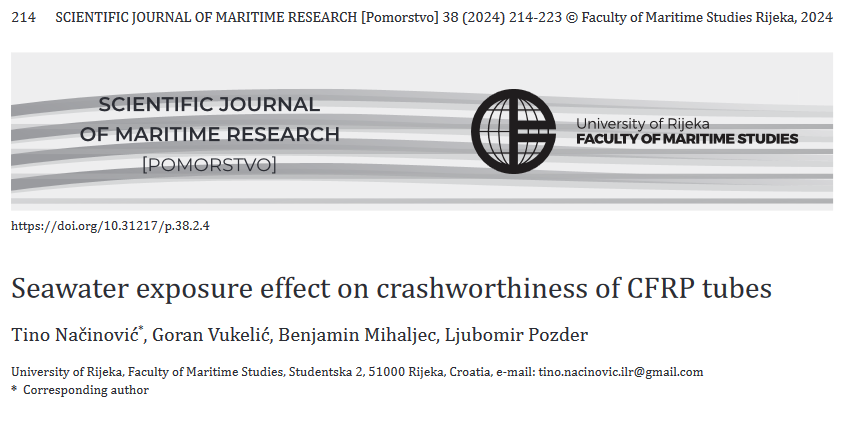Seawater exposure effect on crashworthiness of CFRP tubes
Keywords:
composites, CFRP, material degradation, sea environment, crashworthinessAbstract
This study investigates the effects of seawater exposure on the crashworthiness of two types of carbon/epoxy composite tubes under quasi-static compression. Carbon/epoxy composites, widely used in maritime structures due to their high strength-to-weight ratio and corrosion resistance, may experience altered mechanical properties when exposed to harsh marine conditions. To evaluate these effects, quasi-static crushing tests were conducted on composite tubes after a one-month exposure to natural seawater. Composite tubes were manufactured using hand layup and prepreg technique. By analyzing the behavior of these composite structures under controlled compression, the study aims to provide insights into their structural integrity in marine environments. Results indicate a significant impact of seawater exposure on the crashworthiness of carbon/epoxy composites. The maximum tensile force is considerably lower after the exposure, and hand layup specimens generally withstand the exposure much better than prepregs. The findings contribute to a deeper understanding of material behavior in marine applications, offering practical guidelines for designing and maintaining composite-based maritime infrastructure.

Downloads
Published
Issue
Section
License
Copyright (c) 2024 Tino Načinović, Goran Vukelić, Benjamin Mihaljec, Ljubomir Pozder

This work is licensed under a Creative Commons Attribution-NonCommercial-NoDerivatives 4.0 International License.
Scientific Journal of Maritime Research understands the need for authors to disseminate and maximize the impact of their research. When submitting an article for publishing in Scientific Journal of Maritime Research, it implies that the Corresponding Author transfers, with the consent of all Coauthors, the copyright ownership in the referenced submission, including all versions in any format now known or hereafter developed, to the Scientific Journal of Maritime Research.
Copyright protects your original work and research material and prevents others from using it without your permission. Others will be required to credit you and your work properly, thus increasing its impact. Should your submission be rejected or withdrawn prior to acceptance for publication by Scientific Journal of Maritime Research, this transfer will be null and void.
Authors, users or readers of an article need clear instructions on how they can use the article. Scientific Journal of Maritime Research uses the Creative Commons Attribution-NonCommercial-NoDerivatives (CC-BY-NC-ND) 4.0 International License, which governs the use, publishing and distribution of articles by authors, publishers and the wider general public.
The authors are allowed to post a digital file of the published article, or the link to the published article (Scientific Journal of Maritime Research web page) may be made publicly available on websites or repositories, such as the Author’s personal website, preprint servers, university networks or primary employer’s institutional websites, third party institutional or subject-based repositories, and conference websites that feature presentations by the Author(s) based on the published article, under the condition that the article is posted in its unaltered Scientific Journal of Maritime Research form, exclusively for non-commercial purposes.




